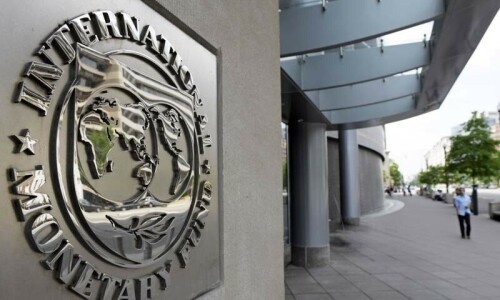 IT is one of the most dreaded words in the dictionary of a politician. ‘Inflation,’ or the ‘I’ word, has played havoc with the electoral plans of political parties in the past in India — including both the Congress and the Bharatiya Janata Party — and the political establishment is hyper-sensitive to price rise.
IT is one of the most dreaded words in the dictionary of a politician. ‘Inflation,’ or the ‘I’ word, has played havoc with the electoral plans of political parties in the past in India — including both the Congress and the Bharatiya Janata Party — and the political establishment is hyper-sensitive to price rise.
Fears of inflation have crippled movement on the reforms front in India for the past two years, but now with crucial state elections round the corner – especially in half a dozen important states including Karnataka, Madhya Pradesh, Rajasthan and Delhi over the coming months – and general elections scheduled for next year, the central government is paranoid about inflationary trends.
On Friday, the official figures of inflation were announced, sending nervous ruling party politicians running for cover. Inflation, based on the Wholesale Price Index, touched a 41-month high of 7.41 per cent – for the week ended March 29 – and there are fears that prices will continue their northward journey over the coming weeks.
Opposition parties, including the BJP, the constituents of the so-called ‘third front’ and even the Left parties that provide outside support to the United Progressive Alliance (UPA) government have already launched a nation-wide agitation against the official policies that they blame for the price rise.
The Congress has been stunned by the spurt in prices and has failed to formulate a policy to counter the opposition campaign. But the bankruptcy of ideas that bedevils the party was best reflected in the initial manifesto of the Congress for state elections in Karnataka: its local leaders promised to provide 25 kg of rice every month at Rs2 a kg to people in the below the poverty line (BPL) category; provision of free colour TV sets to BPL families and loans at three per cent interest to farmers.
In the neighbouring state of Tamil Nadu, the Dravidia Munnetra Kazhagam (DMK), the ruling party (which is also a partner in the UPA government at the centre) swept to power about four years ago, promising free colour TV sets to the poor. Millions of colour TV sets have been distributed over the last four years (besides hundreds of thousands of gas connections and stoves) at a huge cost to the tax-payer, but opposition parties in Tamil Nadu accuse the government of squandering the funds by handing over the free sets to DMK party workers.
Politicians in other states going to the polls later this year can also be expected to come out with such ridiculous promises; many Indian states are reeling under financial crises, caused by implementing such bizarre policies – including provision of free electricity to farmers, and writing off of farm loans.
Inflationary pressures on the economy have been building up all of last year, especially after global crude prices began their sharp climb and breached the $100-mark. But the central government has avoided raising the local price of petrol, diesel, kerosene and gas, fearing a backlash from the electorate.
State-owned oil refiners, haemorrhaging because of the government’s refusal to raise domestic fuel, have been issued bonds to be redeemed years later by a different government that will be confronted by a financial crisis. Similarly, subsidies on food and fertiliser threaten to disrupt the government’s finances, but all such inconvenient aspects are brushed aside for future governments to tackle.
Despite all these artificial measures to insulate the domestic economy from the ravages of global inflation, the government has seen its efforts go waste as prices of essential commodities have been rising steadily.
Inflation had dipped to a low of 3.1 per cent in October and the Reserve Bank of India (RBI), the country’s central bank, was confident that it would be able to restrict it to within five per cent during the fiscal. The inflation rate has shot up since the beginning of the year, nearly doubling over the past five months.
The RBI, which will be coming out with its monetary policy on April 29, is expected to take a tough stance, tightening credit even further. Bankers expect it to raise the cash reserve ratio (CRR) and even up the bank rate further. Fearing a hike, the markets have already reacted sharply, driving the benchmark 10-year bond yield to 8.05 per cent, a nine-month high.
Prime Minister Manmohan Singh and finance minister P. Chidambaram appear weary in the final year of the UPA regime, battling not just opponents within the UPA – who have prevented the duo from initiating any new reforms measures in recent months – but even the monster of inflation.
Singh last week warned that “the constituency for economic reform, so necessary to stimulate economic growth, would diminish,” thanks to inflation. The steep rise in food prices would hurt the cause of macroeconomic stability, he added.
Many of the flagship schemes of the UPA government – including the National Rural Employment Guarantee Scheme (NREGS) – on which it has spent billions of rupees over the past three years appear to have run aground, with charges of massive corruption being leveled, not by NGOs or the media, but by constitutional authorities like the Comptroller and Auditor General of India (CAG).
* * * * *
THE only solace for the beleaguered UPA regime is that inflation is rearing its head globally. And governments around the world appear as unprepared in hammering out a strategy to tackle this beast, which had appeared to be disappearing from the global scenario.
According to the International Monetary Fund (IMF), inflation rate is at its highest since 1995 in the developed world, including the US, Europe and Japan. The continuing surge in the price of oil, food and raw materials are driving inflation around the globe, even as the appetite for energy and commodities – especially in the two major emerging economies of China and India – remains unabated.
The World Bank notes that international food prices have shot up by over 80 per cent in the last three years. The price of rise has shot up by nearly 150 per cent over the last one year. Wheat prices have tripled over the past 12 months – from $4 a bushel a year ago, to about $15 a bushel now, and spot prices touching $22 a bushel.
Steel producers around the world have been hiking prices in recent days, after they were forced to sign new agreements for iron ore and coking coal. ArcelorMittal, the world’s largest steelmaker, for instance, agreed to a 220 per cent hike with mining major BHP Billiton for supplies of coking coal this year. South Korea’s Posco had to pay three times its existing rate for coking coal from Australia, and about 65 per cent extra for iron ore from Brazil.
Oil prices shattered another record last week, when it crossed the $112 a barrel mark. Inflationary pressures are leading to unrest in many countries across the world, and rising prices and shortages have led to food riots in a few countries.
Even in India, despite the recent write-off of farm loans amounting to $15 billion, there has been no slowdown in the number of farmer suicides in distressed regions like Vidarbha in Maharashtra. Over 250 farmers have killed themselves in desperation in the backward region during the first four months of the year, and the rate of suicides has not slowed down even after the government announced a massive write-off of loans in the budget on February 28.
The last year of its rule is proving to be the toughest for the UPA regime; ironically, if the Congress-led front loses power in many of the states and in general elections next year, it will not be because of contentious issues like the Indo-US nuclear deal – that have bogged down decision-making for months at a stretch – but because of economic mismanagement.
For a party with a ‘dream-team’ – comprising key reformers prime minister Singh, finance minister Chidambaram and Planning Commission deputy chairman Montek Singh Ahluwalia – this would indeed be a tragedy.










































Dear visitor, the comments section is undergoing an overhaul and will return soon.